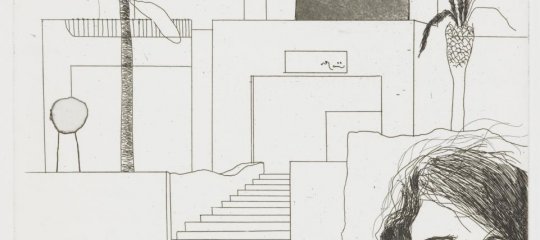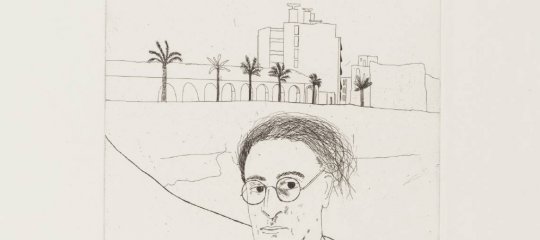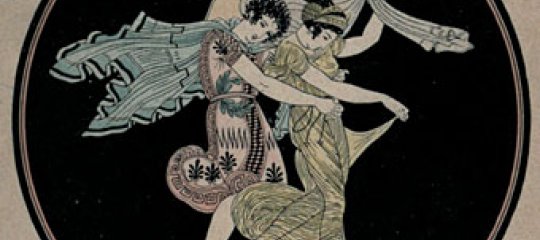Γιορτινά
Vassilis writes, "Αντί κάρτας για τις γιορτές και τα μεθεόρτια σας στέλνω πολλές ευχές και ένα φωτορομάντζο από τις εκδηλώσεις που οργάνωσε ο Τομέας Ελληνικής Γλώσσας και Πολιτισμού του Πανεπιστημίου της Ιορδανίας στις 6 Δεκεμβρίου 2006 σε συνεργασία με το Σύλλογο Ελληνικής Νεολαίας Ιορδανίας. Είχα στείλει παλιότερα το πρόγραμμα. Εκεί εμφανιζόμαστε χωρίς παλτό, μα τώρα είναι αναγκαίο... Τέλος η ντεμί σεζόν.
Βασίλης Οικονομίδης, Αμμάν"
10 Ιανουαρίου 2007

(Ομάδα φοιτητών που εργάστηκαν για την εκδήλωση και η χορευτική ομάδα της Πανελλήνιας Ένωσης Γυναικών Μάνης)
Σχεδόν μήνας πέρασε από τις εκδηλώσεις που διοργανώσαμε στο Πανεπιστήμιο της Ιορδανίας σε συνεργασία με το Σύλλογο Ελληνικής Νεολαίας Ιορδανίας (Σ.Ε.Ν.Ι.). Ο Τομέας Ελληνικής Γλώσσας και Πολιτισμού του Τμήματος Μοντέρνων Γλωσσών είχε την τιμητική του στις 6 Δεκεμβρίου 2006 και οι φοιτητές μας, μετά από ετοιμασίες και πρόβες αρκετών ημερών, έδωσαν τον καλύτερο εαυτό τους και κομμάτι από την ψυχή τους εν μέσω διαγωνισμάτων και προόδων. Ίσως αυτή η εθελοντική κόπωση να μας έδωσε μετά τις εκδηλώσεις την αίσθηση γλυκιάς συνενοχής γύρω από μια εμπειρία όμορφη και μοιρασμένη.
Όλοι οι βασικοί ομιλητές είχαν τον καλό τους λόγο, ο κοσμήτορας της Φιλοσοφικής Σχολής καθ.AhmadMajdoubeh, ο πρέσβης της Ελλάδας στο Αμμάν κ. Τρύφων Παρακευόπουλος, ο πρύτανης του Πανεπιστημίου της Ιορδανίας καθ. AbdelrahimA. Hunaity. Τα νέα ελληνικά έχουν πια, μετά από οκτώ χρόνια προσπαθειών, τη θέση τους στο πρόγραμμα του Πανεπιστημίου και προσελκύουν νέους ανθρώπους με ποικίλα ενδιαφέροντα και πολλά ταλέντα. Συμβαίνει τα τελευταία χρόνια να μην έχουμε παρά ελάχιστα παιδιά μικτών γάμων με ελληνικές ρίζες. Έτσι οι φοιτητές μας είναι στην πλειοψηφία τους Άραβες που έχουν ως κίνητρο για την επιλογή των μαθημάτων μας το προσωπικό τους ενδιαφέρον. Θυμήθηκα με πολλήν εκτίμηση την εξαιρετική δουλειά που είχε κάνει πριν από μένα ο συνάδελφος Δημήτρης Καραδήμας ξεκινώντας με μικρό αριθμό φοιτητών αλλά με τόση όρεξη και επιμονή.

(Βέβαια: και χαιρετισμοί, και σημαίες κι εθνικοί ύμνοι)
Το πιο ενδιαφέρον κομμάτι της μέρας ήταν εκείνο που σχεδιάσαμε γύρω από τον όρο «εμπειρία» (γλωσσική-πολιτισμική-προσωπική). Μίλησα για την εμπειρία της διδασκαλίας και έδωσα παραδείγματα αξιοποίησης πολλών πηγών γνώσης ή πληροφορίας και συνόψισα τις ωφέλειες τις οποίες αποκόμισα από το σύστημα αυτοαξιολόγησης που εφαρμόζω για δεύτερη χρονιά με τους φοιτητές μου. Όμως τα ωραιότερα ήρθαν αργότερα, όταν η Λούμα και η Ντιάνα (παρακολουθούν το δεύτερο επίπεδο αρχαρίων) μίλησαν στα ελληνικά για τη δική τους εμπειρία από τα μαθήματα.

Ο κ. Πέτρος Βρουβάκης έπαιξε στο λαούτο του κρητική μουσική και τραγούδησε μαντινάδες γύρω από το θεματικό πυρήνα της αγάπης. Όταν, στη συνέχεια, ερμήνευσε το «Άστρα μη με μαλώνετε», το κοινό ενθουσιάστηκε.
Όλοι θαύμασαν τον κόπο των παιδιών που ανέλαβαν το μέρος της ποίησης, της μετάφρασης και της απαγγελίας. Ακολουθούν μερικά στιγμιότυπα ως γλωσσικό φωτορομάντζο.

(Η Λίνα, η Καθρίν, η Ρίτα, η Λούμα, η Ντιάνα, ο Φάντι, η Γιουάνα απαγγέλλουν Ελύτη από το Ημερολόγιο ενός αθέατου Απριλίου, στα ελληνικά, αραβικά και αγγλικά και ποιήματα από τη συλλογή του Γ. Βαρβέρη, Στα ξένα)

(Ο Σάμερ και η Όλγκα, φοιτητές του Πολυτεχνείου, απαγγέλλουν στα ελληνικά και στα αραβικά τα «Ευριπίδης Αθηνάιος» και «Παιδί» του Γ. Σεφέρη. Οι μεταφράσεις τους άρεσαν πολύ.)

(Κάτω από το τοπίο του Ουάντι Ραμ έστησαν οι ελληνίδες χορό. Η χορευτική ομάδα της Πανελλήνιας Ένωσης Γυναικών Μάνης έδωσαν κέφι παρουσιάζοντας αρκετά δείγματα παραδοσιακών χορών.)

(Γευσιγνώστες για τον ελληνικό μπουφέ)

(Φιλαναγνώστες στη μικρή έκθεση βιβλίου που στήσαμε)
Με αυτά τα λίγα, σας στέλνω ολόψυχες ευχές για τον καινούργιο χρόνο. Κι αν δεν σας έπεσε το φλουρί, ξαναδοκιμάστε. Επιτρέπεται. «Ας φρόντιζαν».
- Εισέλθετε στο σύστημα για να υποβάλετε σχόλια










